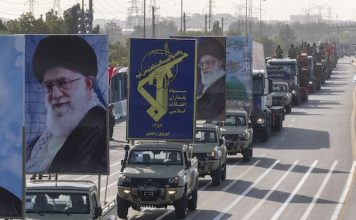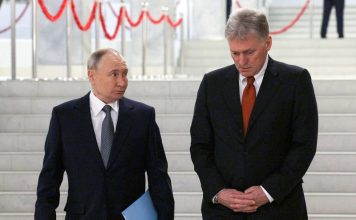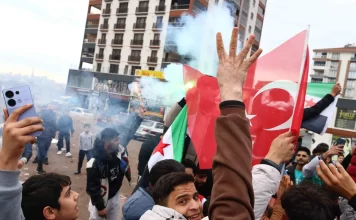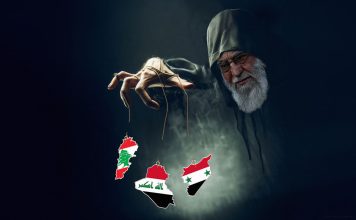By Kayhan Life Staff
On June 23, Iran appointed Brigadier General Mohammad Kazemi as the new head of the Intelligence Organization of the Islamic Revolutionary Guards Corps (IRGC).
General Kazemi replaced Hossein Taeb, who had chaired the organization since 2009.
“The IRGC on Thursday appointed a new intelligence chief, replacing Hossein Taeb,” the Tehran-based English-language Tehran Times reported. “Kazemi took over the post upon a decree by IRGC Commander Major General Hossein Salami, IRGC spokesperson [Brigadier General] Ramezan Sharif said in a statement.”
Mr. Taeb reportedly takes on a new role as a special advisor to General Salimi, Tehran Times added.
[aesop_image img=”https://kayhanlife.com/wp-content/uploads/2022/06/taebu6.jpeg” panorama=”off” credit=”Hossein Taeb (Center). ” align=”center” lightbox=”off” captionsrc=”custom” caption=”Source: Kayhan London” captionposition=”left” revealfx=”off” overlay_revealfx=”off”]
A statement on the IRGC’s Telegram channel confirmed the news, explaining that Taeb had been promoted “to a senior position in the country’s intelligence agencies.”
The IRGC statement asserted that Taeb’s promotion resulted from “successful intelligence and espionage operations conducted in Israel by agencies under his control.”
“Taeb will create an offensive intelligence unit or be in charge of the country’s intelligence agencies,” the statement added.
Although state media and those closely linked with the IRGC have described Taeb’s new post as a promotion, many believe that his appointment as an advisor to the IRGC is a way of sidelining him.
The news about the appointment of a new chief to the IRGC’s intelligence wing coincides with unconfirmed rumors about a failed attempt on Hossein Taeb’s life.
Some people have even claimed that Mr. Taeb receives medical care at the IRGC’s Khatam al-Anbiya Specialty and Subspecialty Hospital in Tehran.
The news about replacing Taeb and rumors regarding an attempt on his life coincided with several reports in the Israeli media, claiming that Israeli intelligence was pursuing Taeb for his alleged role in planning attacks on Israeli tourists in Turkey.
“Taeb drew severe criticism after the assassination of several Iranian senior military commanders and intelligence officers under his watch,” The Arab-language London-based Asharq Al-Awsat newspaper said, quoting Israeli sources. “Many have accused him of committing gross negligence. Therefore, revenge on Israel has become a personal matter for him.”
A source close to one of Iran’s embassies in the region told Kayhan Life: “Following the suspicious death of several IRGC members and the incident at Parchin [military complex on May 25, causing one death and injuring another person], the IRGC intelligence arrested several people in Zahedan [the capital of the southeastern province of Sistan and Baluchestan.].”
“The culprits had reportedly been assured they could get away but were caught,” the source alleged. “Units operating under Taeb’s direction reportedly apprehended the perpetrators. However, the order to eliminate [Hassan] Sayyad Khodayari had come from high up and Taeb had reportedly overstepped his authority. As a result, they pulled the rug from under his feet. They also spread rumors he was an Israeli spy when they were the ones who worked with outside elements. They burned Taeb.”
On May 22, unidentified assailants on a motorcycle killed Hassan Sayyad Khodayari, an IRGC Colonel, outside his home in the Baharestan district in Tehran. Colonel Khodayari, a senior officer in the Qods Force Unit 840, was shot five times while sitting in his car.
Speaking on June 22 at a ceremony for the launch of “Half Century to Total Failure,” a book on Israel’s secret war against Iran, Ali Larijani, senior advisor to Iran’s Supreme Leader Ayatollah Ali Khamenei, said: “I believe Israel has learned how to fight against the revolution. That is why senior military and state officials must be more vigilant.”
Speaking at the same event, Mohammad Hossein Saffar-Harandi, a member of the Expediency Council, said: “Based on the confessions of elements who worked for them [Israelis] and carried out sabotage operations, Israel identifies and hires thugs and pays them handsomely to carry out sabotage operation.”
Shahram Sabzevari, a military analyst, told Kayhan Life: “Most sabotage operations and assassinations are inside jobs, aimed at getting rid of certain people for various reasons. Sometimes domestic elements work on behalf of Israel, carrying out espionage operations or assassinations. Other times, the Ministry of Intelligence or IRGC’s intelligence eliminates someone and blames it on Israel.”
Iranian Intelligence Reportedly Recruits University Graduates to Spy Abroad
“Hossein Taeb and his team paved the way for the assassination of Mohsen Fakhrizadeh and others,” Mr. Sabzevari alleged. “Taeb acted the same way Saeed Emami did, which is why they have sidelined him.”
On Nov. 27, 2020, unknown attackers killed Mohsen Fakhrizadeh, dubbed the “father of Iran’s nuclear program,” reportedly using a “remote control weapon” to fire on his car in Mostafa Khomeini Boulevard in Absard, 80 kilometers east of Tehran. Many believe that Israel was behind the assassination.
Saeed Emami (1958-1999), a former deputy minister of intelligence, was accused of independently organizing the assassination of dissidents, known as the “chain murders.” He was eventually arrested and died in prison under suspicious circumstances on June 19, 1999.
“According to [Rear Admiral Upper Half] Ali Shamkhani [Secretary of the Supreme National Security Council], security agencies had reliable intelligence about an attempt on Fakhrizadeh’s life and knew where the assassination would take place, which implies that elements within the system facilitated the killing of Fakhrizadeh,” Sabzevari speculated.
“Why didn’t they provide more security for Fakhrizadeh? They argue he did not want more security. It was not up to him, was it? Even if it was up to him, they could have assigned non-invasive security around him. They did not even do that because Fakhrizadeh had become a nuisance for the entire system,” Sabzevari argued.
In November 2021, Fereydoon Abbasi-Davani, a member of the Majlis (Iranian Parliament) and former head of the Atomic Energy Organization of Iran (AEOI), revealed that despite Ayatollah Khamenei’s fatwa (religious decree) forbidding the production and use of nuclear weapons, Fakhrizadeh had “created the relevant system.”








